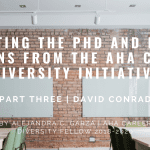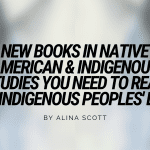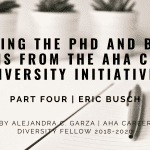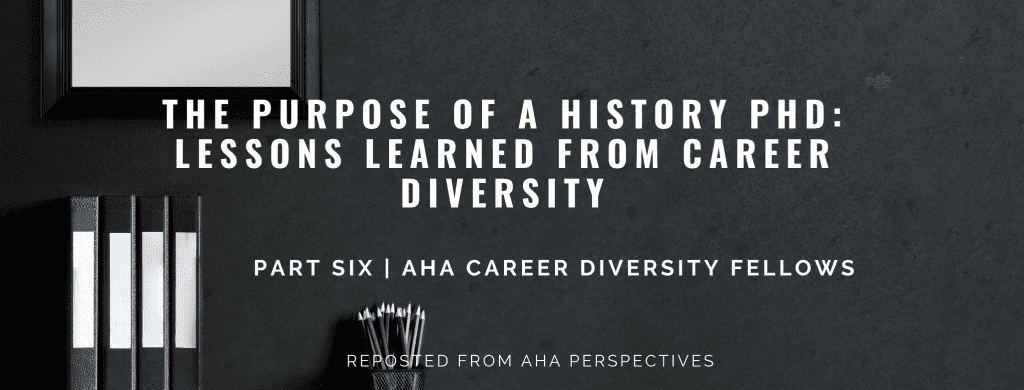
From the editors: Over the past 5 weeks we have been delighted to publish a new series, Navigating the PhD and Beyond: Lessons from the AHA Career Diversity Initiative. The series was presented and curated by Alejandra Garza as part of the AHA Career Diversity for Historians Initiative. As the 2018-20 graduate student fellow, Alejandra’s goal was to show graduate students and professors that the skills developed in a PhD program “are applicable no matter what we do when we leave.” Read more about her experience here. In this last article, we showcase the AHA Career Diversity Initiative and its results more generally. The article published below first appeared in AHA Perspectives on History on August 14, 2020. As preface for this last article in our Not Even Past series, we asked Alejandra Garza to summarize her overall experience and the importance of what was achieved.
AHA Career Diversity Concluding thoughts from Alejandra Garza
In June 2018, I sat in a meeting room at the American Historical Association headquarters in Washington, D.C as one of the nineteen other newly appointed Career Diversity fellows. James Grossman, executive director of the AHA, welcomed us with a question, “What is the purpose of a PhD in History?” We stared back at him, not knowing what the “correct answer” was. Honestly, I don’t think there was just one. Rather, I think Dr. Grossman was planting a seed that the fellows and their faculty partners would water for the next two years. We were expected to leave D.C. after those few days with ideas, not solutions. How were we going to change the culture around career development in our departments? A room full of historians knew that changing the culture of something was not going to happen overnight. We needed to plant the seeds. Two years later, I see those ideas blooming across the universities that participated in this initiative. We are no longer satisfied with the idea that the purpose of a PhD in History leads to one type of job. The various ways twenty history departments used their time in this initiative shows that.
The purpose of a History PhD by the AHA Career Diversity Fellows
The AHA’s Career Diversity for Historians initiative is leading a national conversation to better align the purpose of doctoral education with the varying skills, values, and interests of graduate students and the changing professional opportunities for historians within and beyond the academy. In the spring of 2018, 20 PhD-granting history departments were awarded Career Diversity implementation grants to support a team of faculty and a graduate student fellow to collaboratively build sustainable cultural and structural change in their doctoral programs. After two years of work at our partner institutions, we asked the fellows to discuss what they’ve learned and share some of the innovative ways they are creating student-centered doctoral programs that prepare history PhDs for a range of careers.
In this post, the sixth of a six-part series, the Career Diversity fellows reflect on how two years of department-focused work has changed their views on the purpose of doctoral education in history, on higher education in general, and their own careers.
WHAT DO YOU THINK IS THE PURPOSE OF A HISTORY PHD?
Vanessa Madrigal-Lauchland (Univ. of California, Davis): Most folks interpret “What is the purpose of a history PhD?” as “What can one do with a history PhD?” The Career Diversity initiative has worked hard to answer that question with a resounding, “Anything you want.” However, the heart of the question, “What is the purpose of a history PhD?” is really asking about our goals as humanists in this world. This forces us to reflect on our values, relationship with our communities, and our impact on society.
Derek Kane O’Leary (Univ. of California, Berkeley): I don’t know. But I would love to see my department bring together faculty, grad students, undergrads, and alumni to collaboratively craft an answer to that and publish it on our website.
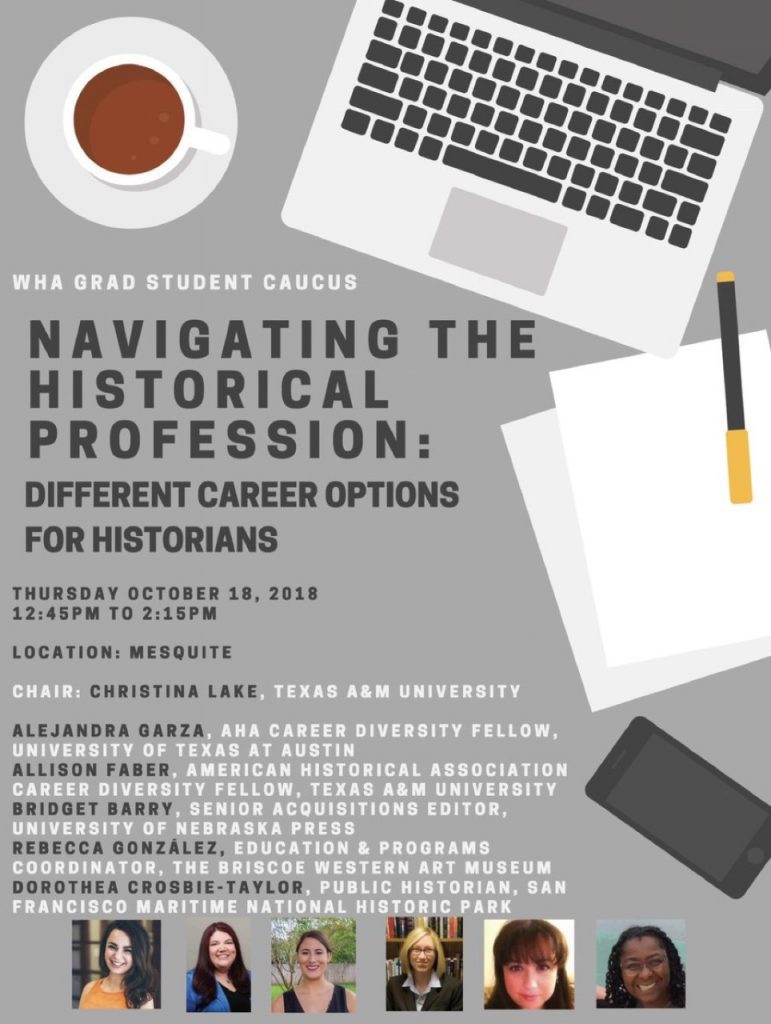
Lillian Wilson (Wayne State Univ.): I worked in museums and as a community college and art college lecturer before beginning the PhD and understood that I needed the doctorate to advance in the museum world or in academia. My work for Career Diversity has revealed to me that I can have a meaningful career that merges my strengths as a teacher and mentor, museum administrator, and scholar.
Matt Reeves (Univ. of Missouri–Kansas City),: The PhD is a signifier of professional approval. What, precisely, that sign of approval means is up to faculty in PhD-granting departments. But those expectations can (and should) change as the nature of the work performed by PhDs changes. As graduate students have the freedom to make their degree work for their careers, faculty have the freedom to redefine doctoral degree requirements. If we believe that people with PhDs are a positive good for society both within and beyond academe, then it’s time that faculty accept diverse new comps fields and capstone projects beyond the traditional dissertation.
Stephanie Narrow (Univ. of California, Irvine): The history PhD naturally attracts the intellectually curious, those who seek to find new perspectives on past and present issues. The PhD should foster this curiosity so that graduate students feel empowered to explore professionalization and career pathways with the same spirit of inquiry that they do their research agendas.
Trishula Patel (Georgetown Univ.): A PhD in history provides training not only in the traditional aspects of research, historiography, and pedagogy, but in the intellectual grounding that we’re given to articulate our work’s value beyond the academy. Many PhD students and faculty write for popular media outlets, teach outside the university, or engage with the public in ways that go beyond the occasional interview or op-ed. The ultimate goal, I believe, should be to give students the intellectual and practical tools to teach, research, and apply what we learn to policy, activism, and the greater good of society.
Allison Faber (Texas A&M Univ.): The most challenging part of this question is to determine one purpose of a history PhD. Broadly, a PhD signals that one has completed the highest level of training in historical research methods and historiography. However, that training is fruitless without sharing the knowledge and tools gained during a doctoral program. So, I would say that the purpose of a history PhD is to give students the ability to effectively use historical thinking to shed light on historical problems and to communicate that knowledge to others.
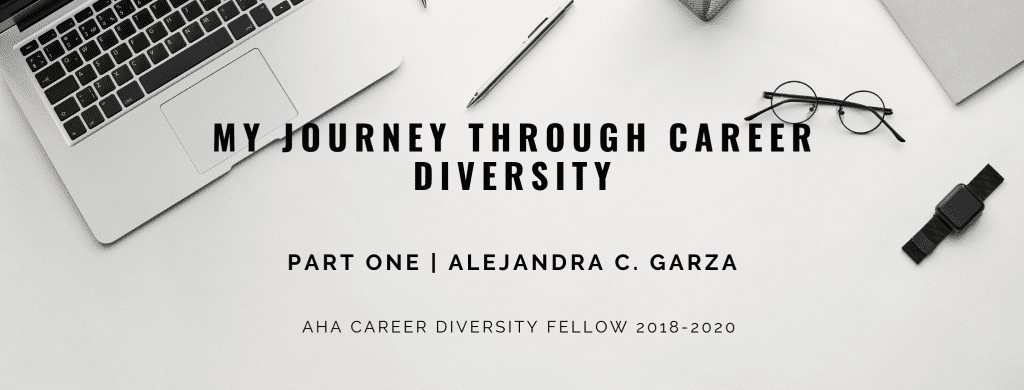
Brian Campbell (Univ. of Illinois, Urbana-Champaign): We need historical expertise now more than ever. Historians excel at explaining difficult concepts in the classroom, and such evidence-based historical learning should be a foundational part of any high school and middle school experience. We could better support graduate students who aspire to teach K–12, as well as in other educational spaces like prisons. Also more historians could be working as analysts and consultants, helping to inform decision-making that affects policy, governance, and culture.
DO YOU THINK ABOUT HIGHER EDUCATION DIFFERENTLY NOW?
Vanessa Madrigal-Lauchland (Univ. of California, Davis): The term “higher education” always brought to mind the image of a bar just out of reach. It’s in the name, right? “Higher.” It wasn’t created for me, the Xicana, the first-generation American, the girl who lived squished in a one-bedroom apartment with her giant family. Even as I earned my way into more advanced programs and became part of the system, the mass and momentum of higher education seemed alien and separate from my passive existence as a student. But this experience empowered me (and other students) to collaborate with faculty, cross-campus institutions, and administrators to make concrete and identifiable change. After this fellowship, I think of higher education as a system supported and driven by a passionate community of individuals committed to education and equality, who are willing to work toward changing a structure that was built to resist it.
Stephanie Narrow (Univ. of California, Irvine): My work has opened my eyes to the complexity of universities and their administrative hierarchies, especially in a large system like the University of California. We’ve found success in navigating institutional channels by partnering with other campus organizations, and working through, rather than against, the university.
Tim Herbert (Univ. of Illinois at Chicago): I’ll admit that I had a naive and privileged view of higher education before I started graduate school. (The Ivory Tower! Life of the Mind!) Participating in Career Diversity accelerated the shift in my views already under way and gave me a better framework for thinking about higher education. I also have a greater appreciation for the work faculty do, especially the committee and service work that is often invisible to graduate students. For instance, I’ve watched our department chair handle budgeting at a time when Illinois’s finances—and thus the University of Illinois at Chicago’s financial state—were emerging from total chaos (Illinois effectively did not have a complete budget for two years prior to 2018).
Andrew Brown (Texas A&M Univ.): This fellowship has provided me with the opportunity to wade into the world of faculty politics and helped me learn more about department and college service than ever before. Service is not a small part of each faculty member’s job but it is probably the area most graduate students are unprepared for in the academy. I learned how decisions are made in our department and college, which helped me gain an appreciation for the people who do that work.
Matthew Villeneuve (Univ. of Michigan): We have a lot of “intergenerational” historical knowledge to draw on, and heeding that accumulated wisdom is one of the things that can broaden our sense of what historical thinking is, and where it happens.
Tyler Krahe (West Virginia Univ.): I’ve become even more convinced that higher education has a lot of room to grow. A department doesn’t have to be all things to all students and it is more than just the faculty within it. The expertise and skills of alumni are a way for a department to cater to the wants and needs of individual students. I hope that is the direction we are headed.
WITH WHAT YOU KNOW NOW, WHAT WOULD YOUR IDEAL OF GRADUATE EDUCATION IN HISTORY BE LIKE?
Vanessa Madrigal-Lauchland (Univ. of California, Davis): Graduate education ought to be flexible, equitable, and diverse. Although social justice might not seem like a key aim of Career Diversity, the topic has been present in every conversation about sustainability, resources, and accessibility. If graduate programs are truly committed to diversity and equal access to education, we must create equitable solutions to facilitate student success.
Tim Herbert (Univ. of Illinois at Chicago): I want graduate education to respond to students’ needs while offering them the proper material, emotional, and intellectual support. Ideally, doctoral programs would be fully funded at a living wage for four to five years in programs designed to be completed in that period of time (though Stacey makes an important point below about the potential problems with this limit). A more flexible education would encourage students to explore the discipline and learn about the different ways of being a historian. This might include teaching, working as interns, and new formats for dissertations. Finally, I’d like to see the “doktorvater” view of graduate advising replaced by a model promoting multiple mentors.
Andrew Brown (Texas A&M Univ.): Teacher training and teaching experience have to be a priority in every graduate program. I would also like to see departments find ways to promote a healthy collegial atmosphere and cohesion in program cohorts through social events and programming. This promotes the mental health of students and reduces the sense of isolation, which is too common in the academy. It takes a long time to finish a PhD and this period cannot be seen as a break from real life. Students need a healthy and friendly atmosphere to get through the rigorous process.
Stacey Murrell (Brown Univ.): Maybe it’s because I work in a premodern field (requiring three languages and travel abroad for research) but four to five years is next to impossible. So not treating the PhD as one size fits all would be ideal. I think that all courses should involve useful assignments that can help students further develop specific skills that are useful in multiple career paths and I second the need for diverse intern opportunities and more opportunities to teach. Finally, I think it’s incredibly important that students have the opportunity to provide feedback on their courses and the program.
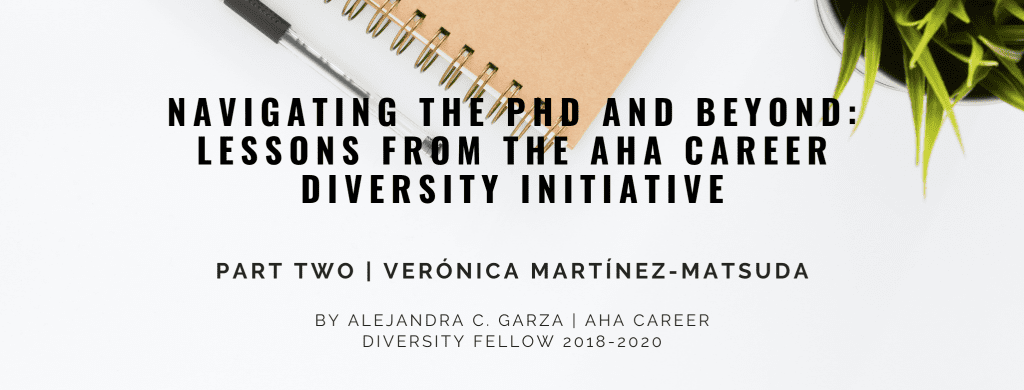
Joseph Stuart (Univ. of Utah): I agree with everything said above about the importance of a living wage, more professional development, and a structure that rewards and incentivizes high-quality advisers. I’d also be interested in creating classes designed to orient students to graduate school, not just to the content and historiography of their field. We ask students to figure out too much on their own, like how to apply for conferences, figure out where to do research, and balance school, work, and life. We can do more to help students, particularly underrepresented groups succeed in graduate school.
Hope Shannon (Loyola Univ. Chicago): Historians can and should be trained to bring historical thinking to wherever it might be most useful and valued. To center graduate programs around the idea that students should be trained to pursue meaningful work also requires providing students with the funding and resources necessary to explore those interests. Unfunded career diversity opportunities don’t help anyone, and they exacerbate the financial difficulties already faced by so many graduate students.
Ramya Swayamprakash (Michigan State Univ.): As an international student, I have raised the importance of thinking beyond the academy for those of us whose existence in this country is dependent on visas. Diverse, demonstrable skills would make any candidate more desirable for a variety of careers outside the professoriate. Graduate programs with large numbers of international students also need to make sure their career development programming takes their unique needs into account.
HAVE YOUR OWN CAREER ASPIRATIONS BEEN SHAPED BY PARTICIPATING IN THIS INITIATIVE?
Alejandra Garza (Univ. of Texas at Austin): I entered the graduate program at the University of Texas at Austin knowing what I didn’t want to do afterward, but I had no idea what I wanted to do. Now, I aspire to work in higher education administration, ideally an office like Texas Career Engagement, where I could help future graduate students see how their grad degree can help them be whatever they want to be. A graduate degree doesn’t limit you in any way, it does the exact opposite.
Shuko Tamao (Univ. at Buffalo, State Univ. of New York): I graduated during the pandemic and am reassessing my career plans right now. As a fellow, I feel I should have some solid ideas for my career plans, but I have to be flexible right now. I have set a broad, long-term career goal, but I may not get to where I aspired a few years ago. But by participating in this initiative, I learned that I could allow myself to envision my career beyond the confinement of “I should,” encouraging myself to be creative and resourceful.
Matt Reeves (Univ. of Missouri–Kansas City): I credit my time as a career fellow with coming to fully accept the positive value of a career outside the academy. It’s easy to pay lip service to the “No More Plan B” talk; it’s harder to accept and believe it. I now know that I can use the skills I learned in graduate school to positive ends outside the academy. Two years ago, I was hired as a part-time librarian in special collections at the Kansas City Public Library. Within a year, I was promoted into a full-time education and outreach position. I credit the promotion to the entrepreneurial mindset I honed in graduate school: constantly improving programs and always making the case for the value of the humanities.

Joseph Stuart (Univ. of Utah): I always knew that I needed to be open to a wide array of career opportunities. The Career Diversity initiative has given me a language and framework for how to use my historical skills to find meaningful employment that pays a living wage. If given the choice of any option, I still want to be a professor. But I know that I could succeed and be happy doing many things.
Matthew Villeneuve (Univ. of Michigan): After working on Career Diversity, I am recommitted to the broader effort of knocking down the walls of the academy—not just those artificial boundaries between historians and the public, but between historians themselves. That conviction makes me all the more committed to pursue a career in the academy. I’m confident that academic historians can continue to find common cause with everyone who uses rigorous historical thinking skills as a part of making their way in the world, and I look forward to being a part of that effort.
Leah Burnham (Georgia State Univ.): This initiative has opened my eyes to other career possibilities and I plan on applying to a variety of jobs. But it’s important to understand that a PhD does not automatically make one qualified for a job outside of academia. Those interested in other careers should participate in informational interviews through AHA Career Contacts and thoroughly research those careers to make sure they’re doing everything in their power to become qualified before applying.
More in this series:
- Part I: My Journey Through Career Diversity
- Part II: Navigating the PhD and Beyond: Verónica Martínez-Matsuda
- Part III: Navigating the PhD and Beyond: David Conrad
- Part IV: Navigating the PhD and Beyond: Eric Busch
- Part V: Navigating the PhD and Beyond: Brian Stauffer
The views and opinions expressed in this article or video are those of the individual author(s) or presenter(s) and do not necessarily reflect the policy or views of the editors at Not Even Past, the UT Department of History, the University of Texas at Austin, or the UT System Board of Regents. Not Even Past is an online public history magazine rather than a peer-reviewed academic journal. While we make efforts to ensure that factual information in articles was obtained from reliable sources, Not Even Past is not responsible for any errors or omissions.

